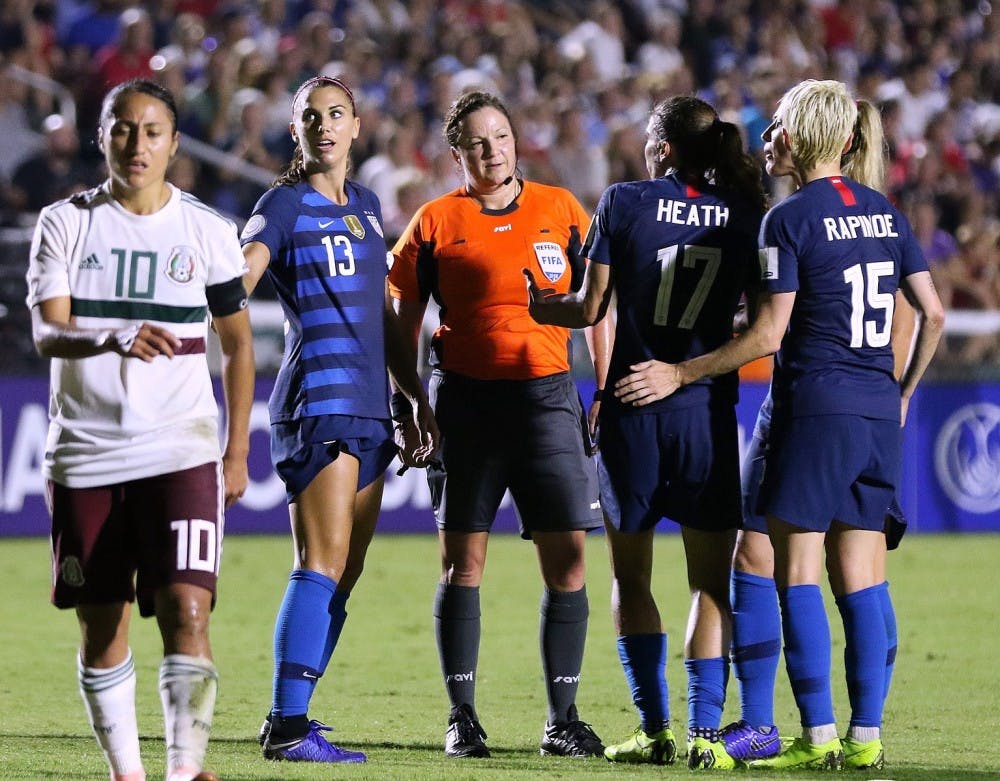The streets of Paris came alive this summer as the Women’s World Cup enthralled the nation. Studying abroad there, I felt an enormous pride wearing my stars and stripes on America’s game days, not just because the U.S. National Team was playing, but because this team was taking the field.
As an avid Boston sports fan, I am used to rooting for my teams in championships. Some teams you root for because of the charisma of the players, some you root for despite their flaws (I’m looking at you, Patriots). But rarely have I been more inspired by a team than the 2019 U.S. Women’s National Team. This is due not only to their prowess on the field, but their unwavering courage and activism off it.
The USWNT went into the World Cup under enormous pressure. They were the defending champions in a field that is getting increasingly stronger, and were out to prove themselves worthy of equal pay with the men’s team. In March, the USWNT sued the U.S. Soccer Federation for gender discrimination, a fight that is headed for trial next May. With this as the backdrop, the USWNT had the world’s biggest stage to show what they are worth. They more than proved themselves. As the players streamed onto the field in Lyon after they won, the stadium rang out in cheers of “USA! Equal pay!”
Over the course of the tournament, the USWNT outscored opponents 26–3, along the way setting a record for the highest margin of victory in a game in the history of the tournament, men’s or women’s, beating Thailand 13–0, and dominated the competition on the way to their fourth World Cup championship. At each stage the team inspired millions of fans, drawing in an American audience for the World Cup Final 22 percent bigger than the men’s final last summer, while the USWNT jersey became the top-selling soccer jersey ever sold on Nike.com in one season.
But the team’s presence off the field rivals their impact on it. The team engages in a number of different political causes. In 2016, co-captain Megan Rapinoe was the first athlete outside of the NFL to follow Colin Kaepernick’s protest of kneeling during the national anthem. Since U.S. Soccer banned kneeling during the anthem, Rapinoe now stands, but does not sing along. Explaining why, she said, “Being a gay American, I know what it means to look at the flag and not have it protect all of your liberties.”
Rapinoe also gained attention when a video clip from earlier in the year resurfaced in which she said she would not be going to the White House if the team won the World Cup, due to disagreements with the President’s policies. After Trump retaliated on Twitter, Rapinoe reiterated her stance, telling reporters: “obviously [I was] answering with a lot of passion, considering how much time and effort and pride we take in the platform that we have and using it for good, and for leaving the game in a better place and hopefully the world in a better place. I don’t think that I would want to go, and I would encourage my teammates to think hard about lending that platform or having that co-opted by an administration that doesn’t feel the same way and doesn’t fight for the same things that we fight for.”
Since the tournament, the team has only expanded its leveraging of its platform for advocacy, for example partnering with Time’s Up to help fight gender discrimination across all industries.
At Princeton, we prize commitment to service. It is our unofficial motto: “In the nation’s service and the service of humanity.” The USWNT embodies this idea, exemplifying excellence in its craft as well as dedicated advocacy beyond it. They use their platform to lift up others and fight for what they believe in. We can do the same in our own lives. More than striving to succeed as students, we should take advantage of the opportunities we have at Princeton to change our communities around us for the better.

Often when athletes use their platform to fight for issues they care about, they are told to stay in their lane, or as Laura Ingraham told Lebron James, to “shut up and dribble.” The USWNT faced the same sorts of criticisms. President Trump tweeted that Rapinoe should “WIN first before she TALKS,” while many commentators called the team arrogant for the way they celebrated their wins. The players have blocked out the noise, however, and focused on both their game and their political values.
The team’s commitment to lifting others up as they rise presents an example for each of us, aspiring World Cup winners or otherwise. They show us how to use our reach to fight for equality, for ourselves and for others, in whatever we do.
Julia Chaffers is a sophomore from Wellesley, Mass. She can be reached at chaffers@princeton.edu.









